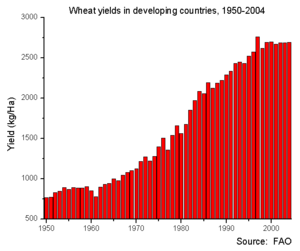“Greatness, generally speaking, is an unusual quantity of a usual quality grafted upon a common man.” William Allen White, journalist
The man that was Norman Borlaug was precisely the individual who William Allen White ,the Kansas journalist of the early part of the twentieth century, must have been reflecting upon when he articulated the above quotation. Borlaug was the simplest and humblest of Midwestern men, but he probably saved more lives than almost any other individual of the past hundred years. You might therefore ask why you have probably never heard of him. The reason would be that his great achievement rests in the quiet scientific backwater of food science, not the most dynamic of fields, but to the estimated billion people whose fruitful lives were made possible by Norman Borlaug, ultimately a incalculably important one. With the vote of a billion people, Norman Borlaug has earned his position of one the RAMPARTS People We Should Know.
Paul Ehrlich wrote a menacing book in 1968, The Population Bomb, that prophesied that the world’s exploding population would soon overwhelm the planet’s capacity to feed humanity and that the near term future would be one of mass starvation and resultant violence. Though taken as gospel for decades after despite progressive evidence to the contrary (similar to global warming hysteria), Ehrlich was unaware that at the time of his treatise, Norman Borlaug had already done much to unravel his fateful predictions.
Borlaug was born and raised in the little Norwegian community of Saude, Iowa in 1904 where he was instilled with the midwestern ethic of self determination and hard work by his farmer parents and relatives. The product of a one room school education, he became the first in his family to attend college, graduating from the University of Minnesota with a forestry degree. The pain and hunger of the Great Depression left an indelible mark upon him, and he never forgot the effect of lack of available food on an individual’s capacity to think, function, and achieve. Remembering an undergraduate lecture on plant pathology that suggested genetic tools to alleviate parasitic rust from plants, he determined to return to Minnesota to complete a PhD in Plant Pathology, and he spent the rest of his life, formulating food production solutions on the stimulus of that brief lecture exposure. Determined to defend his country in World War II, Borlaug found himself isolated from the war because of his scientific skill set, and was instead sent to laboratory work to work on mundane material science such as glues and adhesives.
With the war coming to an end he intensified his desire to study food production, and was asked to use his knowledge of rusts on wheat to help Mexico with a progressive food supply problem. With 14 years of intensive and laborious work, Borlaug eventually achieved through thousands and thousands of genetic breeding experiments what was thought impossible, rapidly resilient wheat plants with higher grain yields and rust immunity. These semi-dwarf hybrids had shorter, thicker stalks that could support a larger head of grain, yet significant resistance in multiple climes to the killer fungal rust that had obliterated crop yields in tropical climes. Mexico under Borlaug’s revolutionary work went from below subsidence grain production to a net exporter of grain. Borlaug was not done with his sacrificial work. He soon spread the knowledge and the wheat varietals to India and Pakistan, warring countries in the sixties that were felt hopelessly inefficient growers to ever be able to feed their burgeoning populations. The two countries agreed on almost nothing, except Borlaug, and soon were finding the capacity to feed their own people. Perhaps coincidentally the hot war cooled between the two neighbors as their hungry populations became satisfactorily fulfilled. In particular, it allowed India, to begin to focus its energies on the inate potential of its population and played no small part in India’s current position as a nascent economic superpower.
Borlaug’s Green Revolution had eliminated in fact what the elitist guessers had fantasized, that mankind was not capable of addressing both human and environmental concerns, and ultimately prosper and flourish. The current arguments regarding climate change and the need to “suppress” man to “save” the world rings no different than Ehrlich’s incorrect tome. Borlaug himself had a telling quote about elitism, stating,
“If they lived just one month amid the misery of the developing world, as I have for fifty years, they’d be crying out for tractors and fertilizer and irrigation canals and be outraged that fashionable elitists back home were trying to deny them these things”. NYT 02.13.09
Borlaug lived into his nineties, bringing similar tactics to grain production in Africa and East Asia as he did for Mexico and Central Asia, and tirelessly promoted the capacity of the poor to become self supportive and self reliant through the power of science. He earned the Nobel Prize for Peace and the Presidential Freedom Award, but his greatest testament was the devotion to his name in countries to whom the “ugly American” tag comes easily. Norman Borlaug was no ugly American. He was the American that brought the power of life to a starving world, and the chance for a life of individual freedom and potential to a billion people. Now that’s defending the RAMPARTS…


